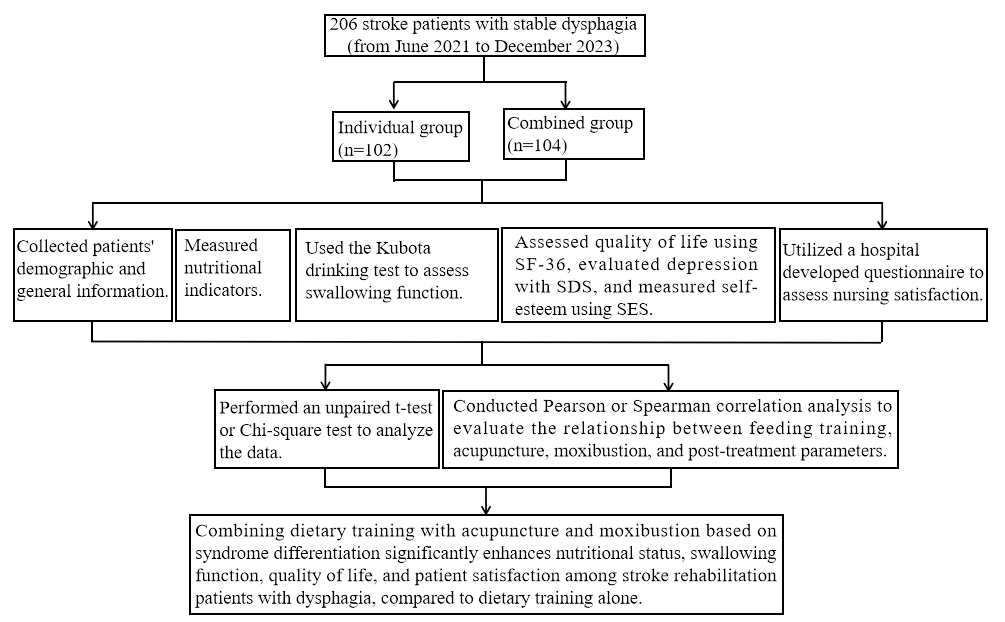Current issue
Archive
Manuscripts accepted
About the Journal
Editorial office
Editorial board
Section Editors
Abstracting and indexing
Subscription
Contact
Ethical standards and procedures
Most read articles
Instructions for authors
Article Processing Charge (APC)
Regulations of paying article processing charge (APC)
GASTROENTEROLOGY / RESEARCH PAPER
Application of Dietary Training Combined with Acupuncture Based on Syndrome Differentiation for Treating Dysphagia in Stroke Rehabilitation Patients
1
Ankang Hospital of Traditional Chinese Medicine, China
Submission date: 2025-03-19
Final revision date: 2025-04-21
Acceptance date: 2025-04-25
Online publication date: 2025-06-08
KEYWORDS
TOPICS
ABSTRACT
Introduction:
Stroke-induced dysphagia significantly impacts patients' nutritional status, quality of life, and rehabilitation outcomes. Conventional therapy primarily involves dietary training, while acupuncture and moxibustion have been utilized in complementary medicine.
Material and methods:
A retrospective cohort study, conducted from June 2021 and December 2023, included 206 stroke patients (aged 40 to 80 years) with stable dysphagia. Patients were divided into two groups: an individual treatment group (n=102) receiving standard dietary training, and a combination treatment group (n=104) receiving dietary training with acupuncture and moxibustion. The intervention lasted six weeks. Nutritional status, swallowing function (evaluated via Kubota drinking test and VFSS), quality of life, depression, self-esteem, and patient satisfaction were assessed pre- and post-treatment.
Results:
Pre-treatment demographics and clinical characteristics showed no significant differences between groups. Post-treatment results indicated significant improvements in the combination group compared to the individual group across all parameters: nutritional status (TSF, AMS, Hb, ALB, PA), swallowing function (Kubota test, VFSS scores: higher in combined, P=0.028), quality of life (SF-36 scores), depression (SDS scores: lower, P=0.022), self-esteem (SES scores: higher, P=0.005), and patient satisfaction (70.19% vs. 54.9%, P=0.034). Correlation analysis confirmed the positive associations between combined treatment and outcomes (e.g., post-TSF r=0.196, P=0.005).
Conclusions:
Combining dietary training with acupuncture and moxibustion based on syndrome differentiation significantly enhances nutritional status, swallowing function, quality of life, and patient satisfaction among stroke rehabilitation patients with dysphagia, compared to dietary training alone. This integrative approach presents a promising adjunctive therapy for post-stroke dysphagia, warranting further investigation in larger, randomized controlled trials.
Stroke-induced dysphagia significantly impacts patients' nutritional status, quality of life, and rehabilitation outcomes. Conventional therapy primarily involves dietary training, while acupuncture and moxibustion have been utilized in complementary medicine.
Material and methods:
A retrospective cohort study, conducted from June 2021 and December 2023, included 206 stroke patients (aged 40 to 80 years) with stable dysphagia. Patients were divided into two groups: an individual treatment group (n=102) receiving standard dietary training, and a combination treatment group (n=104) receiving dietary training with acupuncture and moxibustion. The intervention lasted six weeks. Nutritional status, swallowing function (evaluated via Kubota drinking test and VFSS), quality of life, depression, self-esteem, and patient satisfaction were assessed pre- and post-treatment.
Results:
Pre-treatment demographics and clinical characteristics showed no significant differences between groups. Post-treatment results indicated significant improvements in the combination group compared to the individual group across all parameters: nutritional status (TSF, AMS, Hb, ALB, PA), swallowing function (Kubota test, VFSS scores: higher in combined, P=0.028), quality of life (SF-36 scores), depression (SDS scores: lower, P=0.022), self-esteem (SES scores: higher, P=0.005), and patient satisfaction (70.19% vs. 54.9%, P=0.034). Correlation analysis confirmed the positive associations between combined treatment and outcomes (e.g., post-TSF r=0.196, P=0.005).
Conclusions:
Combining dietary training with acupuncture and moxibustion based on syndrome differentiation significantly enhances nutritional status, swallowing function, quality of life, and patient satisfaction among stroke rehabilitation patients with dysphagia, compared to dietary training alone. This integrative approach presents a promising adjunctive therapy for post-stroke dysphagia, warranting further investigation in larger, randomized controlled trials.
We process personal data collected when visiting the website. The function of obtaining information about users and their behavior is carried out by voluntarily entered information in forms and saving cookies in end devices. Data, including cookies, are used to provide services, improve the user experience and to analyze the traffic in accordance with the Privacy policy. Data are also collected and processed by Google Analytics tool (more).
You can change cookies settings in your browser. Restricted use of cookies in the browser configuration may affect some functionalities of the website.
You can change cookies settings in your browser. Restricted use of cookies in the browser configuration may affect some functionalities of the website.



